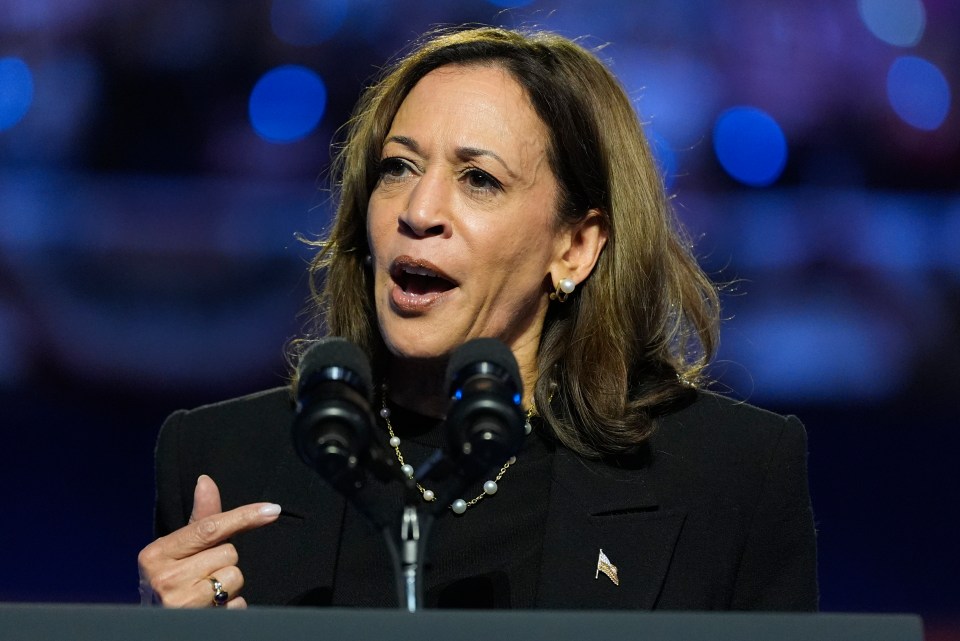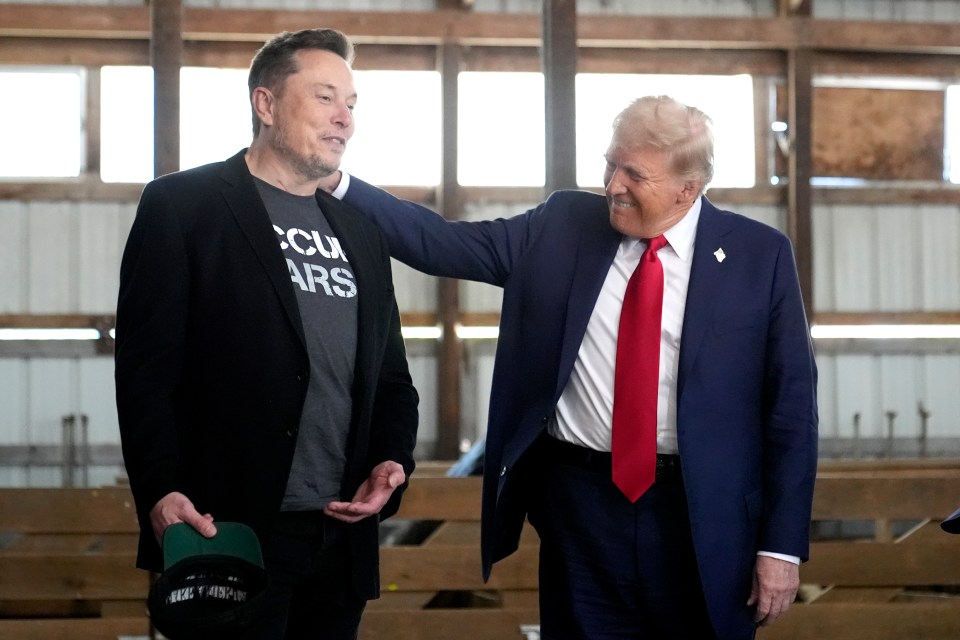DONALD Trump’s surprise alliance with Elon Musk could take AI advancement to the next level, an expert has told The U.S. Sun.
The Tesla billionaire had previously criticized Trump while questioning his political motives.
But after Musk invested a whopping $130 million in the former president’s 2024 campaign, there is a growing feeling within the tech community that the billionaire has received assurances from Trump about relaxing some AI safeguards if he makes a stunning return to the White House next week.
SAFETY FIRST
In 2023, the Biden administration pushed through an executive order detailing strict guardrails to ensure any future developments.
The Department of Defence was tasked with investigating how AI could find weak points in vital software and networks.
The fact sheet released wanted “developers of the most powerful AI systems to share their safety test results and other critical information with the U.S. government.”
Read more on election 2024
This order followed the release of tools like OpenAI’s ChatGPT, which is increasing in popularity and is used every day in many different walks of life.
Last month, Biden introduced more guardrails, which detailed how intelligence agencies, national security operations, and the Pentagon itself can use the technology in various dangerous situations and even make decisions about granting asylum to those who’ve fled a country.
The protocols have been installed to help address the challenges of using AI to resolve key governmental situations, proposing resolutions for everything from cyber attacks to extreme weather patterns and even the development of nuclear weapons.
Yet if the Republicans win on November 5, huge questions remain about whether the plans will be scrapped or altered.
Trump’s viewpoint isn’t clear, but he has committed to rolling back several of the regulations installed by Biden.
However, AI analyst, a consultant with UNMiss, Chelsea Alves has told The U.S. Sun that the increasing restrictions placed upon AI development could hinder innovation.
She fears developers could become hamstrung by red tape and regulation too quickly. Meanwhile, the rapid pace of innovation adds further issues to attempts to regulate an ever-changing industry.
“I think by imposing rigid oversight and regulation on AI, as evidenced in this executive order, the White House may unintentionally handicap the very innovation and agility the Department of Defense relies on to stay ahead,” she told The U.S. Sun.
“If the United States wants to continue to position itself as a leader in this technology, I overthink red tape could be our Achilles’ heel and thwart the progress we’ve been making.”
CRITICAL INNOVATION
While AI has fuelled the rise of programs like ChatGPT—which effectively makes doing basic tasks far easier and more efficient—national Security risks remain of paramount importance.
Yet with efficient tech being used in many different industries, the stricter approach championed by the Democrats could prove problematic.
Alves fears Kamala Harris, who has spoken in the past about the need for solid guardrails to be installed, could stop many companies in their tracks, which, she believes, could stop vital advancements from coming to fruition.
“Recent collaborations—like OpenAI’s partnership with Novo Nordisk for drug research—highlight the potential of AI to accelerate advancements in pharmaceuticals, “Alves continued.
“Increased regulatory steps could delay such innovations.”
Musk, meanwhile, invested some of his fortune in a SuperPAC supporting Trump’s presidential campaign and, according to Alves, “has a vested interest in AI and technology, given how much his companies rely on it.”
“His endorsement aligns with a pro-innovation stance, signaling that he believes Trump could advance tech more than Harris might,” the expert conceded.
Many saw Trump’s 2019 American AI Initiative as a brave attempt to outline AI’s future development while building a framework to safeguard data privacy.
The initiative was supposed to help harness the development of AI, educate people in the field, and assist cooperation with foreign powers.
But with neither Trump nor Harris – despite her close links to Silicone Valley – an expert in AI, they will be searching for specialists to help shape their visions.
MUSK INFLUENCE
This is where the likes of Musk could come in.
“AI will continue becoming more sophisticated and integrated across industries,” Alves stressed.
“Adoption rates will rise as people grow more comfortable with its capabilities. However, the election’s outcome could sway public perception—Trump supports AI innovation, while Harris advocates caution, which could influence how people view and accept AI.”
AI won’t be at the top of either Trump or Harris’ to-do list, but the conversations over federal legislation and ethics will be on the cards sooner rather than later.
With no national law in place, Alves feels whoever the next President is, they will be “hard pressed to come up with formal guidelines for tech businesses to abide by.”
“Undoubtedly, whoever wins the election has big shoes to fill and gaps to bridge when it comes to what the future of AI looks like,” she said.
Read more on the Scottish Sun
“It will be fascinating to see how it pans out.”
Allan Lichtman’s 2024 presidential election prediction
Renowned historian Allan Lichtman has accurately predicted the outcomes of presidential elections since 1984 using his 13 Keys to the White House algorithm. In 2016, he was one of the few scholars who correctly predicted a Trump win. This year, has revealed who he thinks will be inaugurated as the 47th president in January next year based on his system of true and false statements.
If six or more statements go against the White House party, they are projected to lose the presidential election.
Midterm elections: The Democrats suffered losses in the 2022 House elections, meaning the key turns false. (Harris 0-1 Trump)
There is no primary contest: This key turns in favor of Harris because the Democrats got “smart” and rallied behind the vice president after Joe Biden ended his campaign, according to Lichtman. (Harris 1-1 Trump)
The sitting president is seeking another term: This turns false because Biden suspended his re-election campaign. (Harris 1-2 Trump)
There is no third-party challenger: This statement is true because third-party candidates like Robert F. Kennedy Jr. needed to poll at 10% nationally, according to Lichtman. (Harris 2-2 Trump)
The short-term economy is strong: This key goes in favor of the White House Party. (Harris 3-2 Trump)
The long-term economic growth has been as good as the last two terms: This key also swings toward Harris. (Harris 4-2 Trump)
The White House Party has made major national policy changes: This key is also true, according to Lichtman’s theory. (Harris 5-2 Trump)
There is sustained social unrest during the term: College campus demonstrations have erupted in reaction to the Gaza conflict, but no protests have broken out that threaten the fabric of society. This means the key goes in Harris’ column. (Harris 6-2 Trump)
The White House is untainted by scandal: Despite House Republican efforts to impeach Joe Biden, they have been unable to pin a scandal on him. (Harris 7-2 Trump)
The incumbent is charismatic: Harris is not considered a Ronald Reagan or Franklin D. Roosevelt-like figure so the key is false. (Harris 7-3 Trump)
The challenger is uncharismatic: This key goes in favor of the White House party – even though Trump is a showman. (Harris 8-3 Trump)
Lichtman warned that the two foreign policy keys – whether there has been a major success or no failure – could flip either way.
But, even if both statements flipped against Harris, Trump would not have enough keys in his column to win the election.
This post was originally published on here










